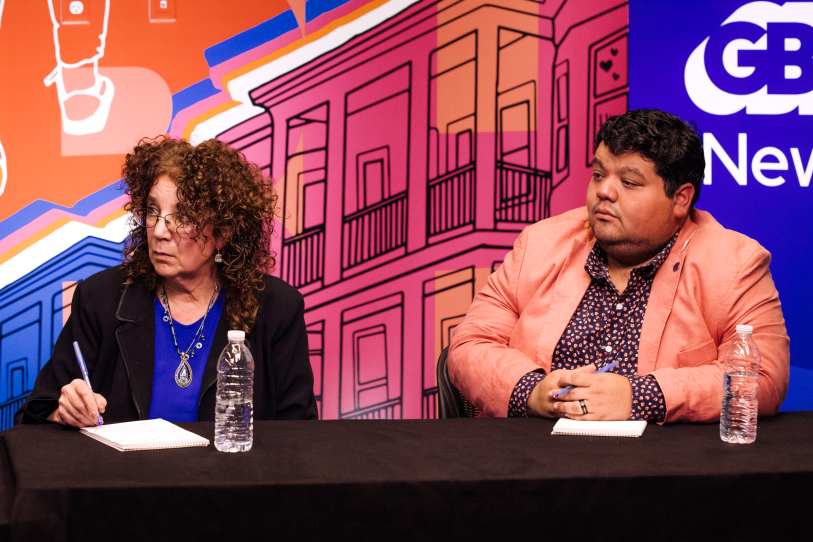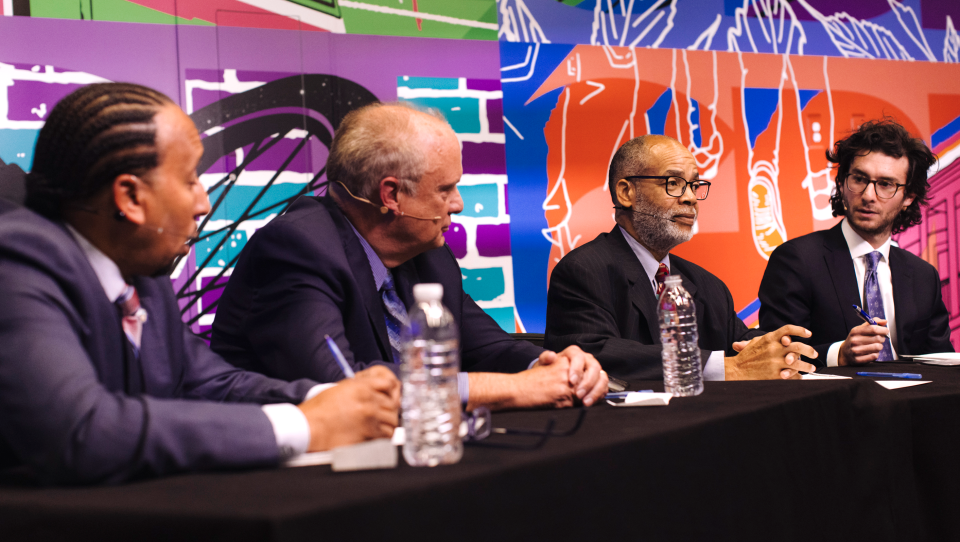This story first ran in GBH News’ politics newsletter. Click here to subscribe and get our rundown of the Massachusetts’ latest political happenings every Thursday morning straight to your inbox.
Worcester is staring down an unusually competitive election season this November. It’s one of 55 Massachusetts cities with elections on Nov. 7, and every City Council seat — including the mayor — has multiple candidates running. That may not sound like a high bar, but it’s the first time that’s happened in years.
GBH News is pitching in to help voters make a decision at the ballot box. We hosted Worcester’s only mayoral debate Monday night, with our Worcester reporter Sam Turken moderating a back-and-forth discussion with all five candidates: Mayor Joseph Petty, City Council Vice Chair Donna Colorio, City Councilor Khrystian King, former Worcester Human Rights Commission Chair Guillermo Creamer Jr. and activist William Coleman. You can watch the hourlong debate in full here, and read GBH News’ coverage here.
Sam recapped what happened for this week’s newsletter, in conversation with GBH’s Hannah Reale. What follows is a condensed transcript that has been edited for clarity.
Hannah Reale: Maybe this is just an assumption on my part, but it feels like you have to piss a lot of people off as mayor to get four people challenging you.
Sam Turken: Joseph Petty’s been mayor for a dozen years now; he’s serving his sixth term. I think that naturally breeds more competition because some people — and this is what some of his challengers are saying — some people are like, “Look, you’ve done a good job, but it’s time for a fresh face.”
Reale: How did you choose what to ask about? You covered housing, policing, climate change, schools, and Worcester’s government structure.
Turken: These were issues that — from my experience reporting on Worcester these past two years — seem to be the biggest concerns for ordinary people.
Obviously, housing is arguably the biggest, or one of the biggest, issues Worcester is facing right now. And that kind of ties into mixed feelings about commercial development and the “Worcester Renaissance.”
And then the police department has been in the spotlight lately for some of the reasons that were mentioned at the debate: the U.S. Department of Justice investigation, the police chief just retired and there continue to be lawsuits against the department for fabricating evidence.
Worcester’s been criticized for not being as aggressive in responding to climate change. Look at some of the floods in Central Massachusetts. Cities and towns that aren’t near the coast are experiencing worse flooding because they just don’t have the infrastructure to handle these more intense precipitation events.
Reale: When the actual back-and-forth was occurring, how would you characterize their interactions?
Turken: There was some back and forth, which we wanted to see. That’s the point of the debate. Mayor Joseph Petty and City Councilor Khrystian King, they got into it a little bit about police accountability and their records holding police accountable. [Watch the candidates’ back-and-forth on Worcester Police here.]
There were some disagreements about the plan of government. Donna Colorio, Joseph Petty and Bill Coleman like Worcester’s current form of government, which is run by a city manager, while Khrystian King and Guillermo Creamer clearly want more of a strong mayor-type system, like that of Boston or Providence.
There was also a bit of difference on climate change and how aggressive Worcester should be about that. Donna Colorio seemed to advocate for more of a slower approach, while some of the others wanted things to move faster.
Reale: Worcester politics is probably not something people are paying attention to if they don’t live there. I’m curious what you’ve heard from your sources about how things have transformed in the last few years.
Turken: I’m putting together a feature on this, so I don’t want to give away too much. Traditionally, Worcester has been more moderate compared to Cambridge, Boston, Somerville. But now, this election, you have a ton of progressive candidates running.

Reale: How did this debate come together? Why did you think it was important to do?
Turken: The way it’s tended to work in Worcester is that there are these forums where you have a bunch of candidates sitting at a table next to each other, and they’re just asked questions and they respond directly to the question. But there’s no back and forth between the candidates. In other words, it’s not a debate.
Reale: Has there been resistance to debates in the past? Is there just not an entity to organize it?
Turken: Worcester is a bit of a — I don't want to say a news desert, but it definitely lacks the media firepower that Boston has. And considering that it’s the second-biggest city in New England, that means a lot is going uncovered. And that's part of the reason why GBH is there in the first place, because we want to try to fill that void.
The Worcester Regional Research Bureau and the Telegram, which are hosting forums, and they actually do a great job of hosting forums for District City Council candidates and At-Large candidates. And then they actually have a mayoral forum coming up. We just felt we could take a different angle.
Reale: Do you think that there was a lot of value added for voters by having them cross-fire in this way?
Turken: It’s always beneficial to see these candidates in action more and to see how they perform under a little more pressure and with a little more pushback.
Another candidate can say whatever they want to their opponent — and call them out on things right on TV. As a reporter, you can’t really do that. And you really did see that happen, like the talk about police accountability between King and Petty.
In other words, I think we were able to cover issues and see some interactions that we haven’t seen before and wouldn’t otherwise see as viewers, as voters.
Reale: Is there anything about the debate that stood out to you?
Turken: After the debate, everybody seemed to be really happy. Donna Colorio said she had a really good time. Guillermo Creamer Jr. said he had a really good time. Joseph Petty made a joke that, because we hosted this debate, now everybody is going to start doing this every election. And Khrystian King was surprised that I dressed up. For some reason, he assumed that, like, I don’t dress up.
It got chippy. But, at the end of the day, everybody’s trying to do the same thing, which is make Worcester a better place.









